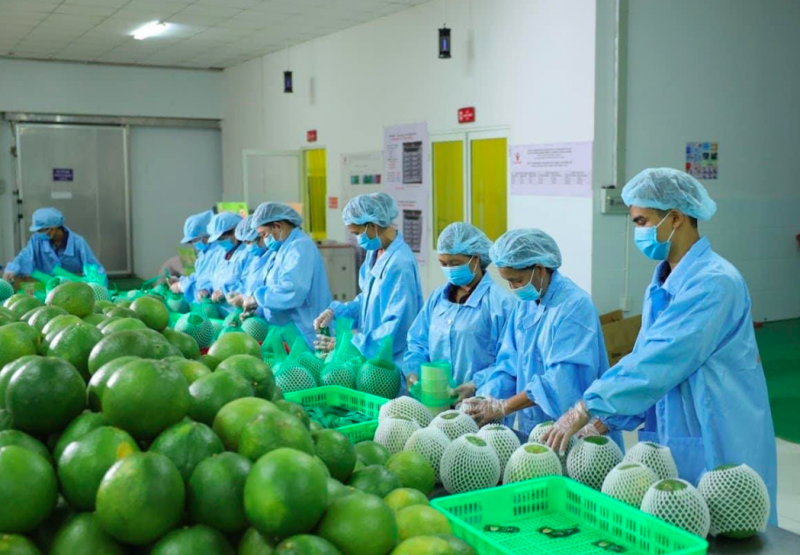Agricultures, Foods, News & Event
Building a brand and maintaining market share for Vietnamese agricultural products in the UK market
Brand building is a long-term solution for Vietnamese vegetables, fruits and agricultural products to maintain market share in the UK and conquer consumers in the host country.
Despite exporting large amounts of vegetables, fruits and agricultural products to the UK market, these Vietnamese products are often sold under distributors’ brands. Therefore, branding is a long-term solution for Vietnamese vegetables, fruits and agricultural products to maintain market share in the UK and conquer consumers in the host country.
Mr. Dang Phuc Nguyen – General Secretary of the Vietnam Fruit and Vegetable Association (VINAFRUIT) shared with the Industry and Trade Newspaper about brand development orientations for Vietnamese agricultural products in the UK market.
Some Vietnamese agricultural products are already present in the UK market, such as coffee, cashew nuts and pepper, durian, and Cao Phong oranges on supermarket shelves in the UK. What do you share about the presence of Vietnamese agricultural products in one of the world’s most demanding markets? From this opening, what is your opinion on the brand development orientation for Vietnamese agricultural products in the UK market?
A number of Vietnamese fruit and vegetable products are present on supermarket shelves and British fruit and vegetable markets, showing that our country’s level of fruit and vegetable production and cultivation is increasingly developing and improving in quality. This is a good sign! Because the UK in particular and Europe in general are one of the markets that are very strict on food safety and hygiene.
However, export turnover to the UK is still modest and not strong because we still lack national and corporate brands for the fruit and vegetable industries. The reason is that we lack in-depth research on the tastes of British consumers. On the other hand, some Vietnamese goods exported through this market but use British or other countries’ brands when consumed, causing Vietnam’s brands to be affected.
In general, branding is necessary to help increase market share in foreign markets; Vietnamese product brands must be based on standards, most importantly must be food safe and hygienic, without residues or banned substances that affect consumers’ health. In addition, the packaging is relatively beautiful, eye-catching, and attractive. Besides, the price factor also has to compete with similar products from other countries.
Here we have an “advantage”, Vietnam has the Vietnam – UK Free Trade Agreement (UKVFTA), with this FTA, they allow themselves to export any type of fruit and vegetables without quotas, but must meet food safety and hygiene requirements. Therefore, branding is very necessary.
Like wooden products, so far Vietnam’s export of fruit and vegetable products to the UK still holds a very modest market share due to competition as well as low brand recognition compared to products from other countries. other. What is your assessment of this reality from the perspective of the fruit and vegetable industry?
First of all, the market share of Vietnam’s fruit and vegetable turnover exported to the UK can be said to be “modest”. In 2022, Vietnam has exported about 20.9 million USD in fruit and vegetable turnover, this turnover increased by 8% compared to 2021 thanks to the UKFTA Agreement, this turnover compared to the whole of Europe accounts for about 10%. In the first 6 months of 2023, Vietnam exported 11.48 million USD to the UK, an increase of 28.3% over the same period in 2022. Thanks to the FTA signed with the UK, the fruit and vegetable industry has helped increase turnover, although the quantity has not increased. much, but the increase rate is quite high.
In addition, the problem that Vietnam’s market share in the UK is not strong is due to the lack of strong fruit and vegetable brands, which means brand recognition is still low because we do not have businesses with large, reputable production potential. participating in this demanding market. Furthermore, the quality of our fruit and vegetable products is unstable, affecting the brand of businesses exporting to the UK market. In addition, although tariff barriers have been reduced, technical barriers are still a huge obstacle for Vietnamese businesses, and overcoming those barriers is also very difficult.
Another issue affecting branding is that the fruit and vegetable consumption trends of British and Vietnamese people are not the same. Meanwhile, it can be said that the fruit and vegetable consumption trends of Vietnam and China are relatively similar. Thanks to similar preferences, Vietnamese fruit and vegetable products sell better to China. In the UK market, the difference between geographical distance also creates slightly different consumption trends of the two sides.
Therefore, businesses must have a way to process and export products that approach British consumer tastes, thereby increasing the quantity. Along with researching consumer tastes, businesses also need strong potential to build a corporate brand, and when the business is famous, a national brand will be formed.

Information from the Vietnam Trade Office in the UK, the market door is wide open for Vietnamese fruits, vegetables and agricultural products. However, accessing this market is not easy because of competition and high requirements for agricultural product quality. What challenges does this pose for the Vietnamese fruit and vegetable industry in its branding strategy to deeply participate in the UK market in the coming time, sir?
The Vietnam Trade Office in the UK has made accurate observations. The British market is a market where when we export vegetables and fruits, they do not apply quotas but only have the most important requirements on food quality, hygiene and safety. Therefore, a brand must be built with time and a roadmap, not something you want to have. Next, the corporate and national brand must be based on the quality of products brought into the UK market for consumption, must be based on production with modern technology, and meet the consumption trends of British consumers. as well as standards and quality. In general, encapsulated in four words, Vietnamese fruit and vegetable products must meet the standards of green – clean – beautiful – delicious. Those are the standards when consumers think of Vietnamese fruits and vegetables.
Currently, in the UK market we do not have businesses strong enough to enter this market with their own brands and be able to compete effectively with other countries.
To compete, first, Vietnamese businesses need to build raw material growing areas that meet export standards to the UK, at least one growing area must meet GlobalGAP standards. In addition, we must also improve appropriate crop varieties to produce products that meet British consumer tastes. Processing, preservation and packaging technology of enterprises must be improved to the world’s advanced level. Only then can we bring Vietnamese products by ship and container to the UK market to lower prices and compete with countries close to the UK market such as Africa, South America…
Second, a strategy to help form a brand is the role of the system of foreign Vietnamese Trade Offices, here the Vietnamese Trade Office in the UK, to help Vietnamese businesses access the British market and reach buyers, corporations and large companies to connect and cooperate in production and business; through the organization of annual trade delegations and trade promotion fairs for the fruit and vegetable industry. From there, once you have a corporate brand, move on to building a national brand. Those are the challenges we have to do in the coming time.

